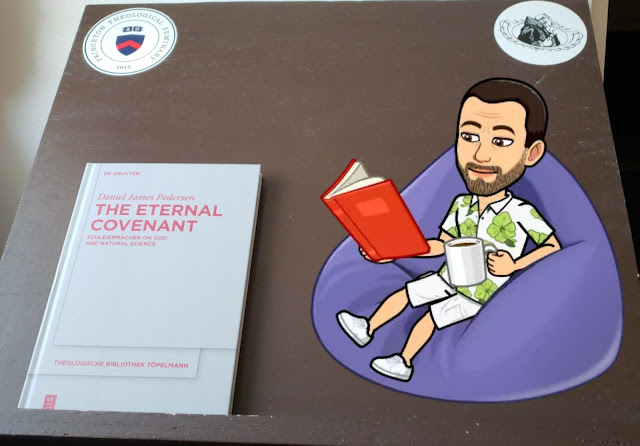Brief Book Note: Pedersen’s “The Eternal Covenant”
Eagle-eyed readers of DET with sharp memories for detail may recognize this author and / or book. The author is a friend of the blog. He wrote two very good guest posts on Schleiermacher back in 2017, and I highly recommend them to you. In fact, pause your reading of this post and go read those two first:
Daniel James Pedersen, The Eternal Covenant: Schleiermacher on God and Natural Science, Theologische Bibliothek Töpelmann (Berlin: de Gruyter, 2017).
I can’t say enough nice things about this book. I’m no Schleiermacher specialist, but I’ve read a decent bit of his work and have been interested in him for a while, and this book was absolutely riveting. Daniel’s argument is very tight, and he keeps the reader’s nose to the grindstone from start to finish.
The main focus of the volume is the “eternal covenant” that Schleiermacher affirms between Christian theology on the one hand, and “completely free, independent, scientific inquiry” (p. 3) on the other. Often, this covenant is take as mere assertion, or perhaps as correlation. Many critics of Schleiermacher, especially, describe this as an unfounded assumption of Schleiermacher’s theological program such that if one disagrees on this point, then one can ignore everything else that Schleirmacher has to say.
You can’t see it, but I’m doing some serious scoffing at that notion as I write this…
As Daniel rightly explains, Schleiermacher’s account of this eternal covenant is the result of arguments rather than an unfounded assumption. The whole book is an exercise in demonstrating this claim, including tracking Schleiermacher’s engagement with philosophers like Spinoza, Leibnitz, and Kant, as well as investigating precisely what scientific ideas Schleiermacher was interacting with. Here’s something of a summary statement:
I thoroughly enjoyed and definitely learned from this book. It is rather expensive, unfortunately, but this is the book that you should buy if you’re only going to buy one book on Schleiermacher.
A brief comment in evaluation: I view Schleiermacher as one of the important forerunners of dialectical theology. And I both understand and accept Pedersen’s point that Schleiermacher’s thought possesses “an infinite creator-creature distinction” (p. 73). I’m just not sure that it’s the right kind of distinction. But fleshing that out would require a lot of work on Schleiermacher’s account of divine and creaturely causality, as well as his analysis of religious psychology (i.e., the feeling of absolute dependence).
But who knows? Perhaps I can get Daniel to record a video with me about all this once I’ve had time to think about it a bit more…
In the meantime, and before this book note altogether stops being “brief,” go buy his book!
==================================
Follow @WTravisMcMaken
Subscribe to Die Evangelischen Theologen
- How to Understand Schleiermacher's Theology—A guest post by Daniel Pedersen.
- Authority and Bible in Schleiermacher’s Theology—more from Daniel Pedersen.
Daniel James Pedersen, The Eternal Covenant: Schleiermacher on God and Natural Science, Theologische Bibliothek Töpelmann (Berlin: de Gruyter, 2017).
I can’t say enough nice things about this book. I’m no Schleiermacher specialist, but I’ve read a decent bit of his work and have been interested in him for a while, and this book was absolutely riveting. Daniel’s argument is very tight, and he keeps the reader’s nose to the grindstone from start to finish.
The main focus of the volume is the “eternal covenant” that Schleiermacher affirms between Christian theology on the one hand, and “completely free, independent, scientific inquiry” (p. 3) on the other. Often, this covenant is take as mere assertion, or perhaps as correlation. Many critics of Schleiermacher, especially, describe this as an unfounded assumption of Schleiermacher’s theological program such that if one disagrees on this point, then one can ignore everything else that Schleirmacher has to say.
You can’t see it, but I’m doing some serious scoffing at that notion as I write this…
As Daniel rightly explains, Schleiermacher’s account of this eternal covenant is the result of arguments rather than an unfounded assumption. The whole book is an exercise in demonstrating this claim, including tracking Schleiermacher’s engagement with philosophers like Spinoza, Leibnitz, and Kant, as well as investigating precisely what scientific ideas Schleiermacher was interacting with. Here’s something of a summary statement:
Schleiermacher’s [position on the eternal covenant, as well as his] remarks on method can only be properly understood in light of his clear, concrete claims supported by detailed arguments as we saw in regard to his accounts of natural development, his account of a world and absolute versus relative miracles, his criticisms of absolute miracles on the basis of divine perfection, and his extraordinary account of the world as the revelation of God. (p. 168)
I thoroughly enjoyed and definitely learned from this book. It is rather expensive, unfortunately, but this is the book that you should buy if you’re only going to buy one book on Schleiermacher.
A brief comment in evaluation: I view Schleiermacher as one of the important forerunners of dialectical theology. And I both understand and accept Pedersen’s point that Schleiermacher’s thought possesses “an infinite creator-creature distinction” (p. 73). I’m just not sure that it’s the right kind of distinction. But fleshing that out would require a lot of work on Schleiermacher’s account of divine and creaturely causality, as well as his analysis of religious psychology (i.e., the feeling of absolute dependence).
But who knows? Perhaps I can get Daniel to record a video with me about all this once I’ve had time to think about it a bit more…
In the meantime, and before this book note altogether stops being “brief,” go buy his book!
==================================
Follow @WTravisMcMaken
Subscribe to Die Evangelischen Theologen


Comments
Best,
Daniel
p.s. Sorry about the price. I am going to apply to get DeGruyter to publish a paperback version. Still expensive, but better.